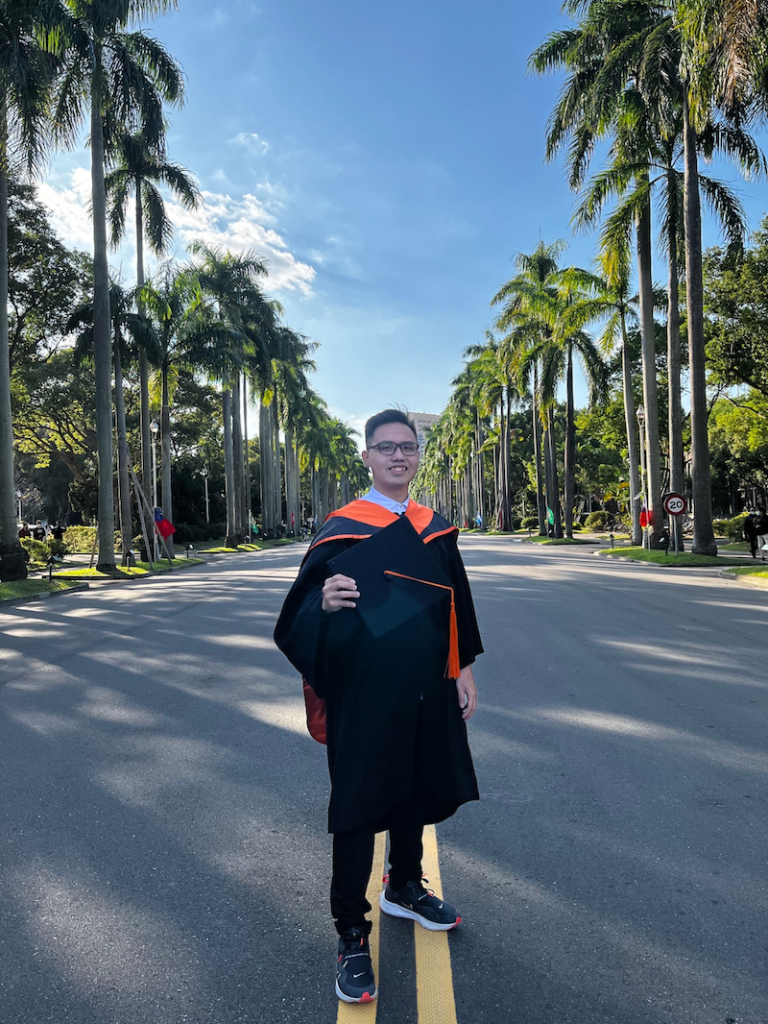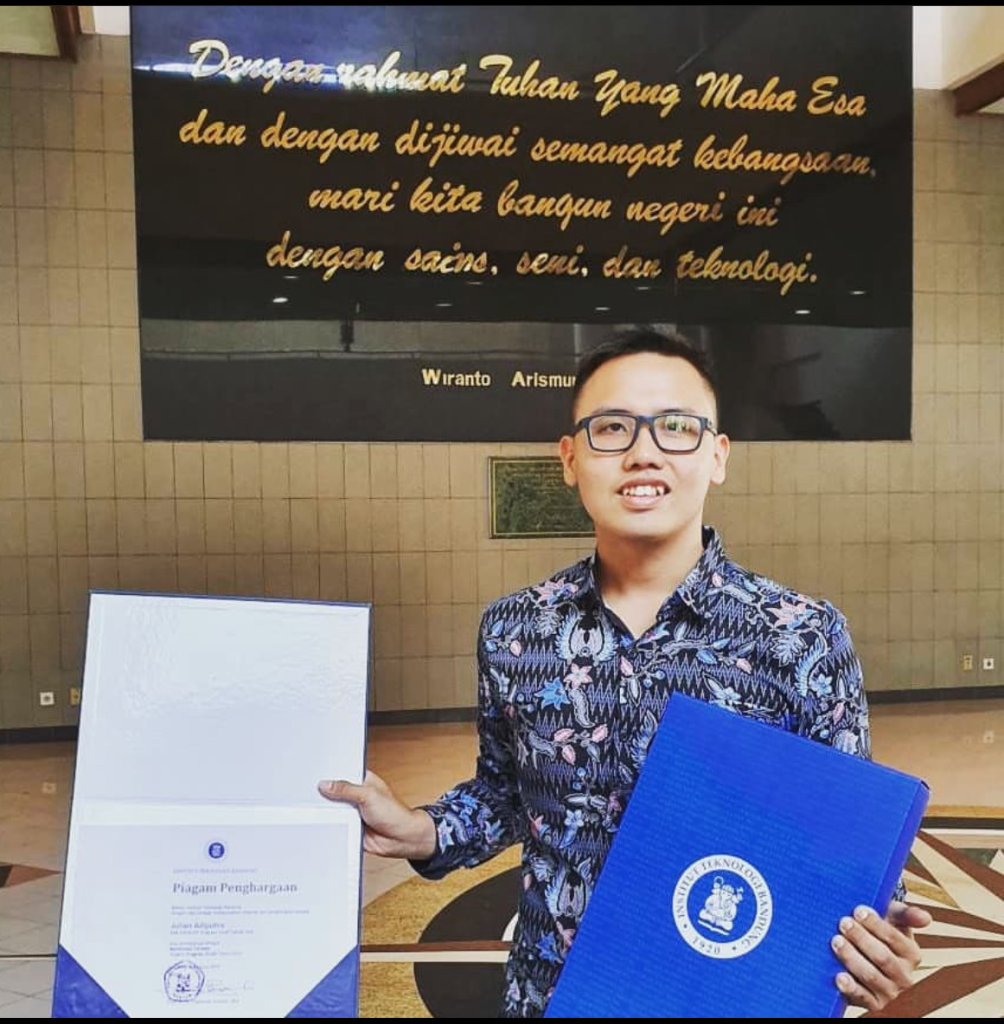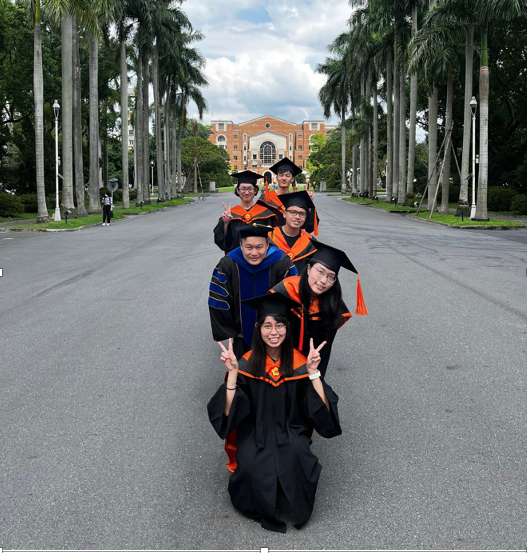Interviewer: Tobias Gimenez.
Interviewee: Julian Adiputra.

Julian Adiputra, a civil engineer from Indonesia, embarked on a unique path that eventually led him to pursue his master’s degree at the prestigious National Taiwan University (NTU) in Taiwan. In this exclusive interview, Julian shares insights into his educational journey, choices, and the factors that influenced his decision-making.
From Indonesia to NTU: More than a Two-Year Expedition
Julian’s academic journey began at the renowned Bandung Institute of Technology, where he obtained his bachelor’s degree in civil engineering. Subsequently, he decided to further his education and pursued a master’s degree at NTU in Taiwan.
Reflecting on his time at NTU, Julian mentions that he has been in Taiwan for approximately two years, encompassing the duration of his master’s program plus 1 and a half years working in the field after that, until now.

From Childhood Aspirations to High School Realizations
Contrary to popular narratives of childhood dreams, Julian clarifies that his decision to study civil engineering crystallized during high school, not earlier. He shares that he was initially pushed towards a medical career by his parents. However, recognizing his strengths in mathematics and physics were better than those in biology, he gravitated towards civil engineering, a field aligning with his natural aptitudes.
Julian Adiputra reflects on the challenge of articulating the specific reasons behind his passion for civil engineering. “Like someone enjoying playing soccer without a specific reason, I find it hard to pinpoint exactly why civil engineering holds a special place in his heart” he reflected.
Choosing Taiwan and NTU: A Tale of Research, Scholarship, and Earthquake Engineering
Delving into Julian’s decision to choose NTU for his master’s, he reveals that earthquake engineering was the focus of his academic passion. Aware of Taiwan’s seismic activity and the country’s expertise in earthquake research, Julian saw NTU as the perfect institution to further his studies in this field. Despite the allure of potentially higher-ranked institutions, NTU stood out for its unparalleled resources available for the students. Moreover, the availability of a scholarship played a crucial role in his decision, as he was determined not to burden his parents financially.
Julian recounts the challenges he faced during the application process. However, with the advice of a senior, Julian secured a scholarship from NTU alongside a research assistant position under his professor, making his academic journey financially feasible.
Language Barriers and Cultural Adaptation
The language posed a significant challenge for Julian Adiputra upon his arrival. While his family maintained a strong Chinese cultural influence, they primarily communicated in Indonesian. Even though Julian had acquired Mandarin proficiency in high school, he was surprisingly unable to speak the language upon arriving in Taiwan. Throughout his university years, his Mandarin skills lay dormant, gradually fading from memory. Consequently, by the time he arrived in Taiwan, he had nearly forgotten how to speak the language.
His Mandarin proficiency was limited to basic daily needs and food-related expressions. Despite a three-month preparation course, the practical application of the language in Taiwan proved more challenging than anticipated. After three to four months of immersion in Taiwan, he started to find the language more manageable.
Educational Challenges and Choices
Given his Chinese heritage and somewhat similar facial features to Taiwanese students, some professors, perhaps unintentionally, overlooked his status as an international student. Despite informing them of his international background when he first arrived, there were moments when professors seemed to forget, assuming he could follow the class in Chinese.
While required classes were offered in full English, after around 15 or 20 minutes, some professors would switch to speaking Chinese. This transition posed difficulties for Julian, particularly in the first semester when his command of the language was limited. Despite these challenges, Julian adapted by relying on self-learning methods and discussing learning materials with his lab mates. He made use of course materials and discussion results to navigate the language barrier and grasp the content on his own.
Pursuing Chinese language courses during his master’s degree at NTU was entirely a personal choice. Recognizing his intention to work in Taiwan, he proactively enrolled in general Chinese classes for one year.
His approach took a different turn after the second semester. Julian chose to attend the Mandarin training center of National Taiwan Normal University (NTNU) during the summer break, then sit in and absorb the lessons passively during the third semester. This decision aligned with his strategic plan, as he intended to focus on job interviews during the upcoming fourth semester. He aimed to maximize his learning in the preceding three semesters, emphasizing the importance of acquiring as much language proficiency as possible in preparation for his professional pursuits.
Overcoming the Challenges
Reflecting on his experiences, Julian noted the willingness of his Taiwanese classmates to go the extra mile to help international students. If there was something he did not understand or if the professor used Chinese during class, Julian could rely on his classmates for clarification. While they might have had to switch to English to accommodate their non-Chinese-speaking peers, Julian found that his classmates were eager to engage and assist. The overall atmosphere in his master’s program was one of inclusivity and support, making Julian feel fortunate to have formed strong bonds and friendships during his academic pursuits in Taiwan.

Professional Integration and Cultural Differences in the Workplace
Moving into the professional sphere, Julian secured a position at TYLin Taiwan Branch, an international civil engineering consultant company in Taipei.
He explains his choice of this particular company, highlighting a pivotal moment when TYLin offered scholarships to the top two GPAs of the structural division of NTU. Fortunately, Julian secured this scholarship, which not only came with a monetary prize but also presented an invaluable opportunity for a two-month internship during the winter break of 2022. With his professor’s approval, he embarked on this professional experience.
By the end of the internship period, TYLin offered Julian to join them full-time after graduation. He seamlessly transitioned from graduation in July to stepping into his job at the company as a Structural Engineer. The synergy of academic excellence, scholarship opportunities, and practical experience culminated in Julian securing a position at a company aligned with his aspirations (Two of the projects he has worked for are showcased below).
He elaborates on the collaborative nature of design work at TYLin, highlighting that the team leader’s role is centered around inspection and providing guidance rather than directly participating in the design process. The main design responsibilities are in charge of Julian and his colleagues. There is no strict distinction between primary and secondary roles; both team members share design tasks equally, maintaining a balanced division of responsibilities.
He emphasizes the diversity of responsibilities that structural engineers engage in design and structural reviews. This multifaceted role showcases the breadth of Julian’s expertise and the varied challenges he navigates in his capacity as a structural engineer.
He expressed gratitude for the friendly environment in Taiwan, noting that his colleagues were welcoming and willing to help, especially during his initial struggles with Mandarin.
Lastly, he acknowledged differences in the working culture compared to Indonesia, emphasizing that Taiwanese colleagues give due credit for individual contributions. “If you did something good, they will give you credit. Nobody will take your work as their work,” he observed.


Balancing Work, Learning, and Social Life
Julian emphasized that learning never stops, especially in the dynamic field of civil engineering. He underscored the importance of adapting to new challenges and staying updated on industry developments. The company’s internal training sessions and seminars are essential in enhancing his skills and knowledge.
Future Aspirations
When asked about his plans, Julian shared his ambition to start his own business eventually. He envisions reaching a senior managerial position within the next decade while building his own company simultaneously. This business venture might involve real estate development, combining his engineering expertise with entrepreneurial endeavors.
Julian Adiputra’s academic journey is a testament to the importance of aligning personal passions with educational and career choices. From navigating scholarship challenges and selecting an institution to pursue his further engineering research interest to finding a workplace where he feels he can contribute and develop, Julian’s story provides valuable insights for aspiring students and professionals. As the interview concludes, it is evident that Julian’s journey is marked not just by academic pursuits but by a genuine love for his chosen field, echoing the sentiment that true success is found at the intersection of passion and opportunity.




